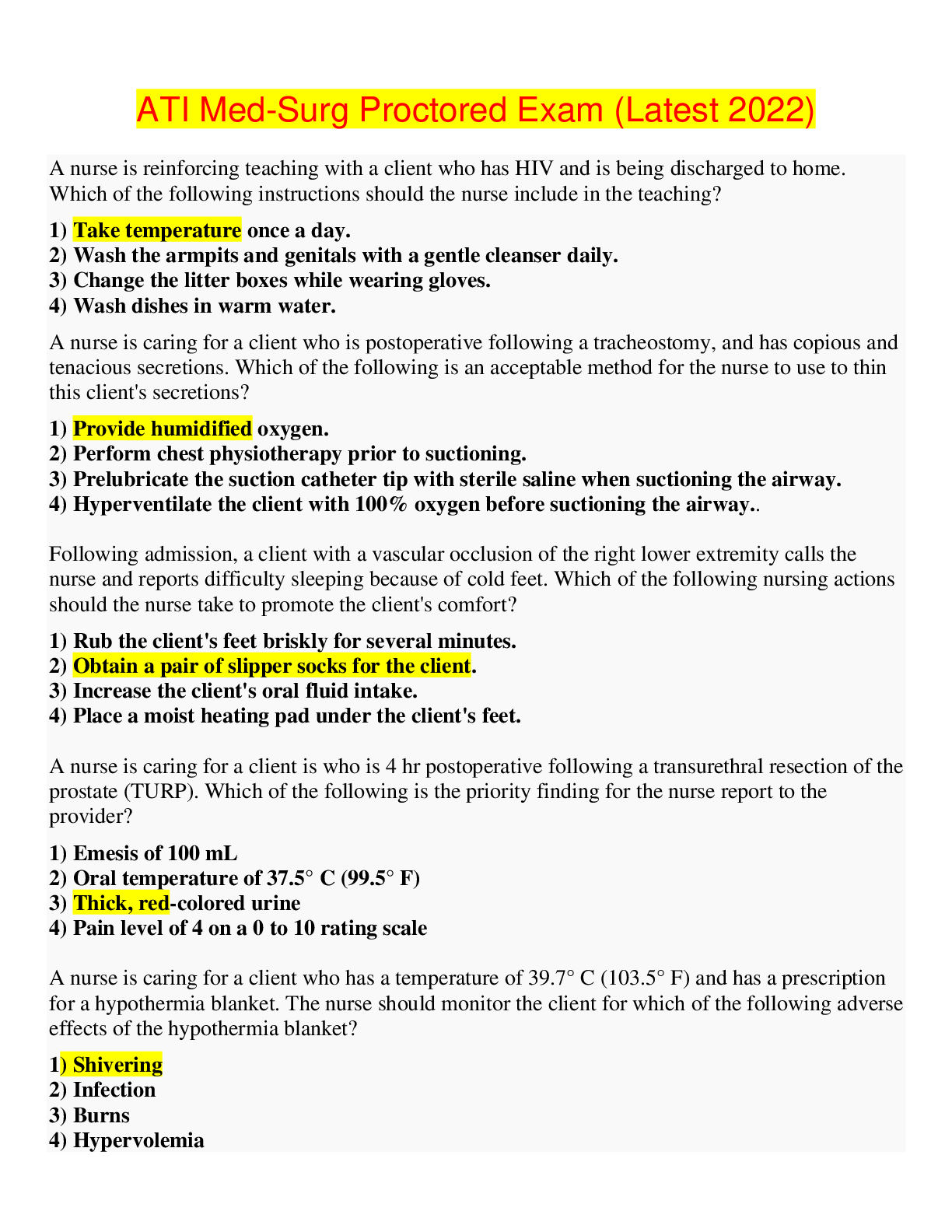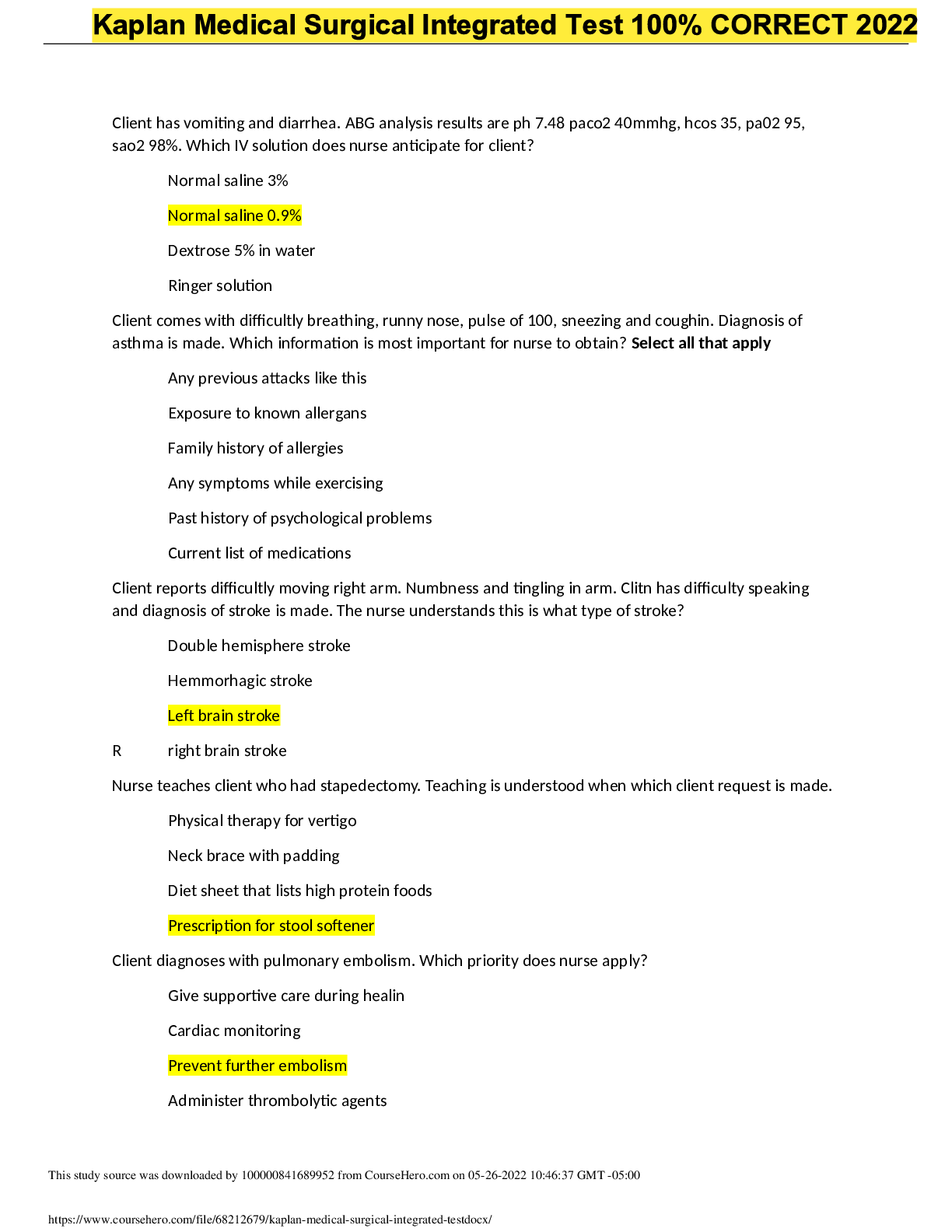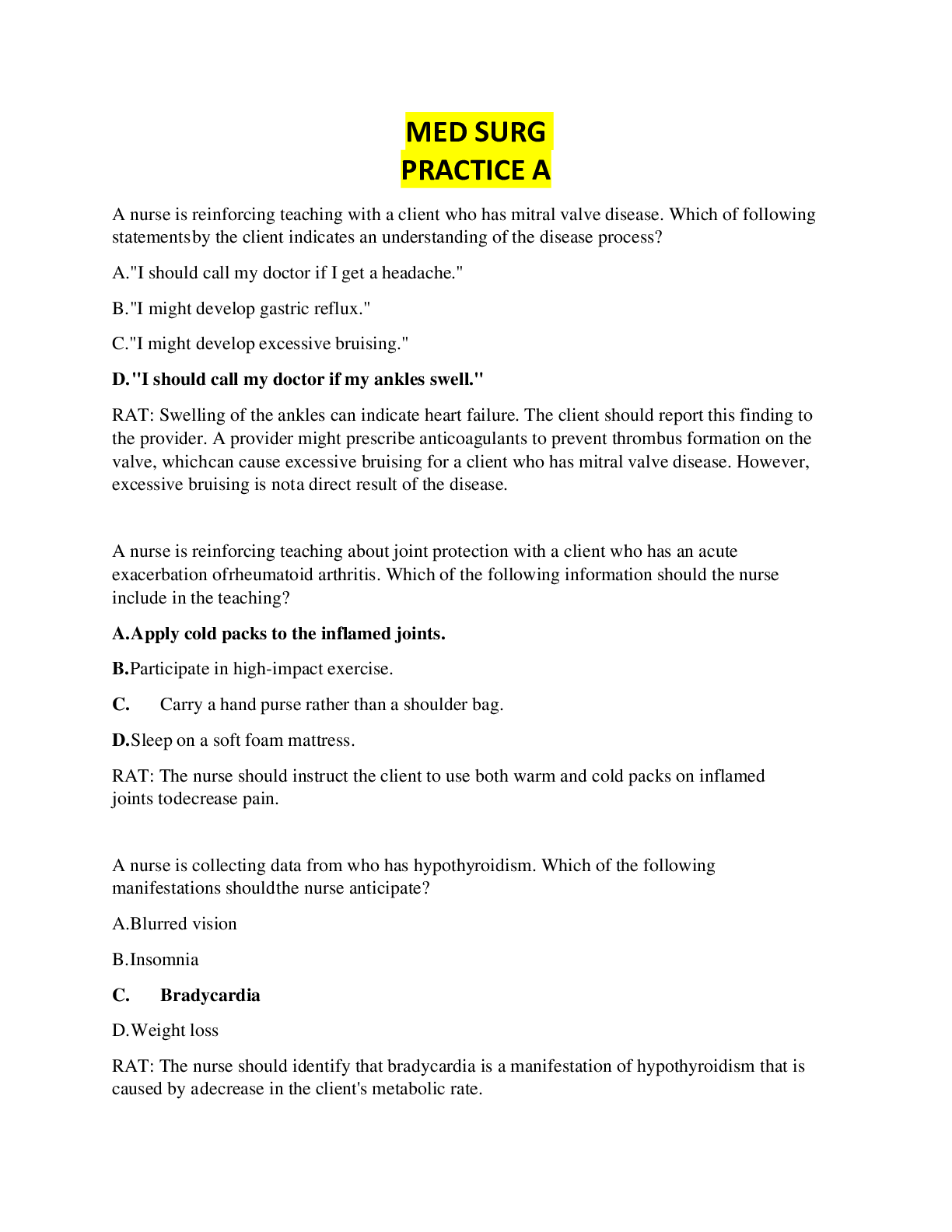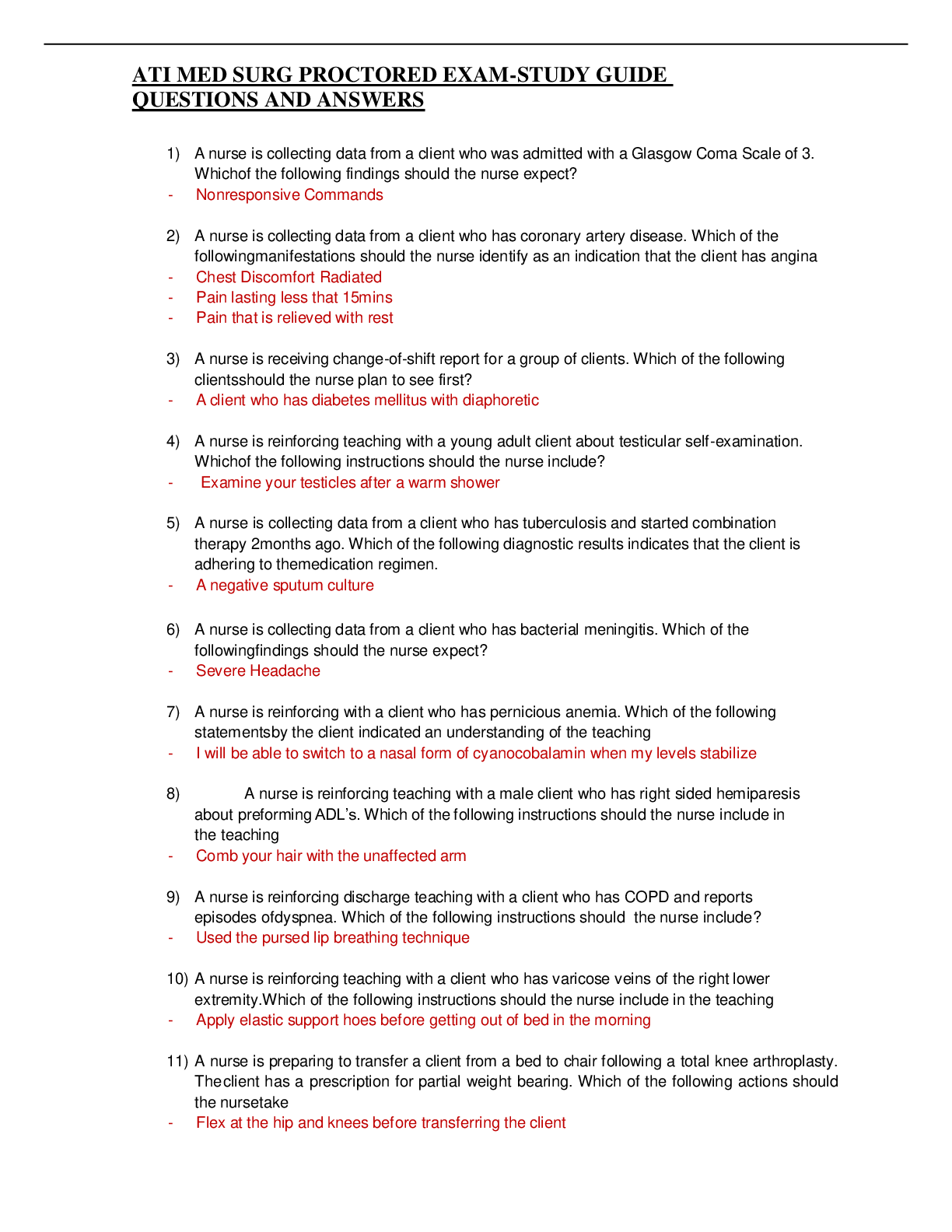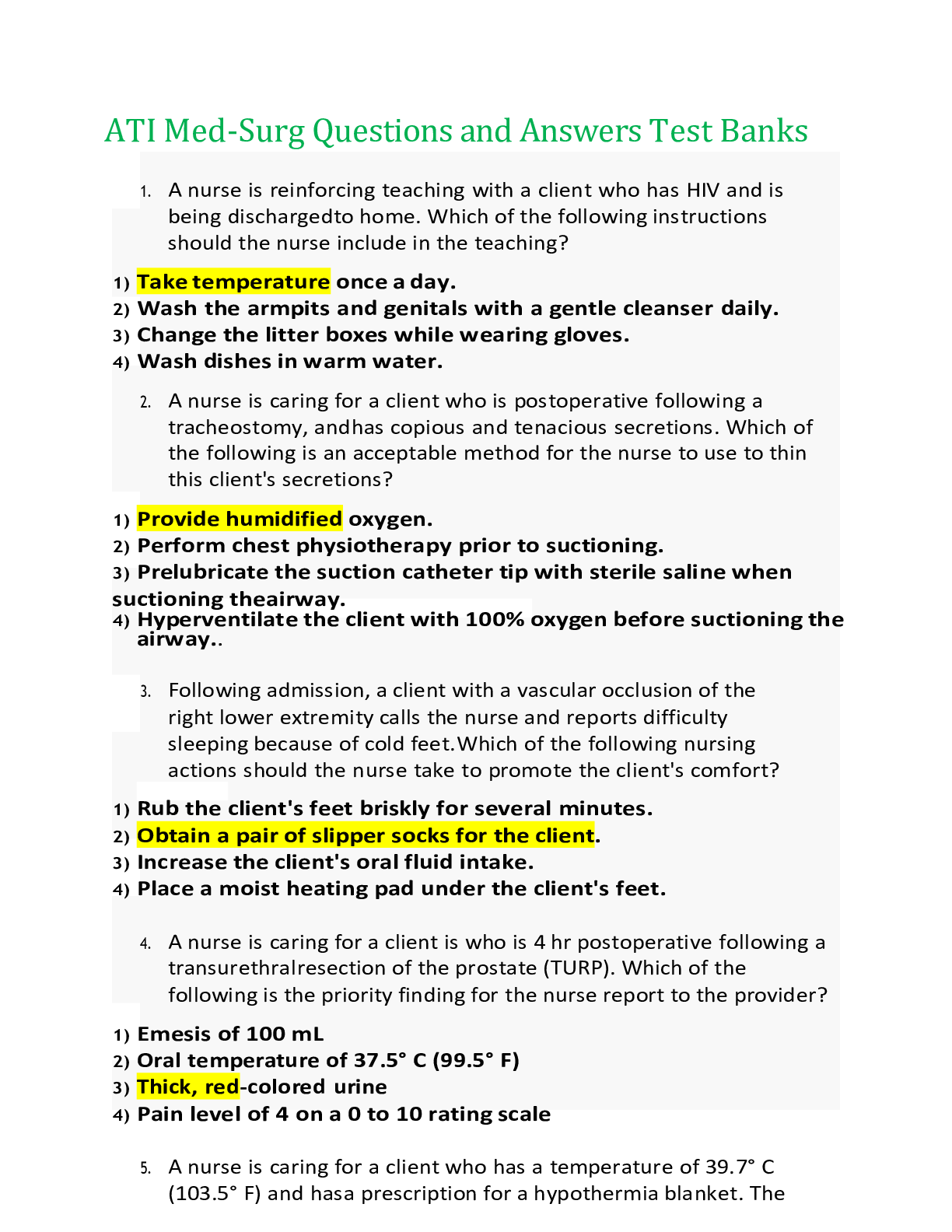*NURSING > ATI MEDICAL SURGICAL > NSG 245 Actual mid-term Med Surg 1 Exam,100% CORRECT (All)
NSG 245 Actual mid-term Med Surg 1 Exam,100% CORRECT
Document Content and Description Below
•A patient is prescribed omeprazole 20 mg PO BID, clarithromycin 500 mg PO BID, and amoxicillin 1 gram daily for the treatment of peptic ulcer disease (PUD). What is the most important instructi... on for the nurse to give the patient about these medications? Selected Answer: B. Complete the full course of al medications as prescribed. Answers: A. Take the drugs with a full glass of water B. Complete the full course of al medications as prescribed. C. Consume 8 ounces of yogurt or buttermilk daily while taking these drugs. D. Take the drugs on an empty stomach, 1 hour before breakfast and at least 2 hours after dinner. •Question 2 0.5 out of 0.5 points The nurse explaining pantoprazole (Protonix) to a patient with recurring heartburn explains that the medication Selected Answer: C. Treats gastroesophageal reflux disease by decreasing stomach acid production Answers: A. Reduces gastroesophageal reflux by increasing the rate of gastric emptying. B. Coats and protects the lining of the stomach and esophagus from gastric acid C. Treats gastroesophageal reflux disease by decreasing stomach acid production D. Neutralizes stomach acid and provides relief of symptoms in a few minutes •Question 3 0.5 out of 0.5 points The nurse requests the client to sign a surgical informed consent form for an emergency appendectomy. Which statement by the client indicates further teaching is needed? Selected Answer: B. "I will be glad when this is over so I can go home today." Answers: A. "I will not be able to eat or drink anything prior to my surgery." B. "I will be glad when this is over so I can go home today." C. "I can practice relaxing by listening to my favorite music." D. "I will need to get up and walk as soon as possible." •Question 4 0.5 out of 0.5 points The nurse is assessing a client in the day surgery unit who states, "I am really afraid of having this surgery. I'm afraid of what they will find." Which statement would be the best therapeutic response by the nurse? Selected Answer: C. "Tell me about your fears of having this surgery." Answers: A. "Don't worry about your surgery. It is safe." B. "Tell me why you're worried about your surgery." C. "Tell me about your fears of having this surgery." D. "I understand how you feel. Surgery is frightening." •Question 5 0.5 out of 0.5 points It is highly recommended that patients with asthma, chronic bronchitis and emphysema have pneumonia and flu vaccinations for which reason? Selected Answer: D. Respiratory infection can cause severe hypoxia and possibly death in these patients Answers: A. These vaccines produce bronchodilation and improve oxygenation B. All patients are recommended to have these vaccines C. These vaccines help reduce the tachypnea they experience if they contract the disease D. Respiratory infection can cause severe hypoxia and possibly death in these patients •Question 6 0.5 out of 0.5 points Client asks what coronary arteries have to do with angina. When determining the answer, the nurse should take into consideration that the coronary arteries Selected Answer: B. carry blood from the aorta to the myocardium Answers: A. supply blood to the endocardium B. carry blood from the aorta to the myocardium C. carry reduced-oxygen content blood to the lungs D. carry high-oxygen-content blood from the lungs toward the heart •Question 7 0 out of 0.5 points Which of the following should a patient be taught after a hoidectomy? Selected Answer: B. Use prescribed pain medication before a bowel movement. Answers: A. Take mineral oil prior to bedtime to soften the stool. B. Use prescribed pain medication before a bowel movement. C. Eat a low-fiber diet to rest the colon. D. Administer oil-retention enema to empty the colon. •Question 8 0.5 out of 0.5 points Upon assessment, the nurse suspects that a patient with COPD may have bronchospasm. What manifestations validate the nurse’s concern? (Select all that apply) Selected Answers: B. Compromised gas exchange D. Wheezes E. Decreased airflow Answers: A. Ascites B. Compromised gas exchange C. JVD D. Wheezes E. Decreased airflow •Question 9 0.5 out of 0.5 points The nurse is instructing a patient who is experiencing diarrhea associated with a microorganism not to use an antidiarrheal medication. The patient asks, “Why can’t I take something to stop the diarrhea?” How should the nurse respond to this patient? Selected Answer: D. “Antidiarrheal medications slow down the elimination of the microorganism causing the diarrhea." Answers: A. “Your physician does not like to use antidiarrheal medications.” B. “The potassium you are taking will help to slow down the diarrhea.” C. “Antibiotics are always used to treat the microorganism, but antibiotics may worsen the diarrhea.” D. “Antidiarrheal medications slow down the elimination of the microorganism causing the diarrhea." •Question 10 0.5 out of 0.5 points The nurse identifies the nursing diagnosis Risk for Injury as appropriate for a patient with type 2 DM who states, “I can’t feel my feet anymore.” Which condition does the nurse suspect the patient is experiencing? Selected Answer: C. Peripheral neuropathy Answers: A. Type 1 DM B. CAD C. Peripheral neuropathy D. Gout •Question 11 0 out of 0.5 points The nurse is caring for a patient who has experienced a laparoscopic appendectomy. The nurse recalls that this type of wound heals by Selected Answer: D. Secondary intention Answers: A. Tertiary intention B. Partial-thickness repair C. Primary intention D. Secondary intention •Question 12 0 out of 0.5 points Aspirin is ordered for a patient who is admitted with a possible stroke. Which information obtained during the admission assessment indicates that the nurse should consult with the health care provider before giving the aspirin? Selected Answer: A. The patient has dysphasia. Answers: A. The patient has dysphasia. B. The patient has atrial fibrillation. C. The patient states, “My symptoms started with a terrible headache.” D. The patient has a history of brief episodes of right-sided hemiplegia. •Question 13 0.5 out of 0.5 points Mr. Webb develops shortness of breath and lower extremity-dependent edema. The nurse suspects Jack is experiencing heart failure. Which laboratory test is used to confirm the diagnosis of heart failure? Selected Answer: D. Brain natriuretic peptide (BNP) Answers: A. Creatinine clearance B. Partial prothrombin time (PTT) C. Blood urea nitrogen (BUN) D. Brain natriuretic peptide (BNP) •Question 14 0.5 out of 0.5 points When starting an IV, the usual standard of care is to perform a maximum of how many unsuccessful punctures before calling for assistance? Selected Answer: C. Two Answers: A. One B. Four C. Two D. Three •Question 15 0.5 out of 0.5 points A patient with end-stage COPD and heart failure asks the nurse about lung reduction surgery. What is the best response by the nurse? Selected Answer: C. “You and your physician should discuss the options that are available for treatment.” Answers: A. “You are not a candidate because you have heart failure.” B. “You wound have a difficult time recovering from the procedure.” C. “You and your physician should discuss the options that are available for treatment.” D. “At this point, do you really want to go through something like that?” •Question 16 0.5 out of 0.5 points Which of the following classes of antihypertensive drugs should a patient be weaned off slowing to avoid the risk of severe rebound hypertension Selected Answer: A. Beta-blockers Answers: A. Beta-blockers B. ACEI C. CCB D. Diuretics •Question 17 0.5 out of 0.5 points A patient is admitted to the PACU following a total abdominal hysterectomy. During the initial assessment, the patient tells the nurse she thinks she’s going to “throw up.” A priority nursing intervention would be to Selected Answer: D. position patient in lateral recovery position. Answers: A. administer antiemetic medication as ordered. B. obtain vital signs, including oxygen saturation. C. apply sequential compression device (SCD) to bilateral extremities D. position patient in lateral recovery position. •Question 18 0.5 out of 0.5 points The laboratory tests the nurse would expect the physician to order to confirm a diagnosis of MI include Selected Answer: A. LDH, CK-MB, troponin Answers: A. LDH, CK-MB, troponin B. Serum potassium, EKG C. Sedimentation rate, ALT D. Serum calcium, aPTT •Question 19 0.5 out of 0.5 points A college professor complains of a dry cough for the past 6 weeks. It worsens when he is supine. He has episodes of heartburn, which he self-treats with an over the counter antacid. He chews mints for his “bad breath.” Which of the following is a possible cause for this patient’s cough? Selected Answer: A. Gastrointestinal reflux Answers: A. Gastrointestinal reflux B. Pneumonia C. Chronic postnasal drip D. Asthma •Question 20 0.5 out of 0.5 points A patient who is scheduled for surgery in a week tells the nurse doing the preoperative assessment about an allergy to bananas, kiwifruit, and latex products. Which action is most important for the nurse to take? Selected Answer: B. Alert the surgery center about the latex allergy. Answers: A. Notify the dietician about the food allergies. B. Alert the surgery center about the latex allergy. C. Reassure the patient that all allergies are noted on the medical record. D. Ask whether the patient uses antihistamines to reduce allergic reactions. •Question 21 0.5 out of 0.5 points The nurse is teaching a patient who is prescribed prophylactic daily isoniazid (INH) for conversion of a tuberculin test. What should the nurse include in this patient’s teaching? Selected Answer: B. Report numbness and tingling of extremities to the physician Answers: A. This drug turns the urine red-orange, which is harmless B. Report numbness and tingling of extremities to the physician C. Periodic eye examinations are required during treatment D. Do not use aspirin while taking this drug because abnormal bleeding will occur •Question 22 0 out of 0.5 points The nurse provides discharge teaching for a patient with acute gastritis. Which patient statement indicates that teaching has been effective? Selected Answer: A. “I will eat only bland foods.” Answers: A. “I will eat only bland foods.” B. “I will have annual endoscopy exams.” C. “I will avoid using aspirin and NSAIDs for routine pain relief. D. “I will fully cook meat, poultry, and eggs products. •Question 23 0.5 out of 0.5 points Mary Smith, a 45-year-old African-American woman, is admitted to your unit. After you have completed your initial cultural assessment and received the initial blood work, you make a note that Mary has a BMI of 32; weight of 288 lbs; height of 5 feet, 5 inches; triglyceride level of 160; blood pressure of 160/98, and pulse of 92. Based on your assessment, you conclude that Mary may have Selected Answer: B. Metabolic syndrome Answers: A. Myocardial infarction B. Metabolic syndrome C. Diabetes D. Sickle cell disease •Question 24 0.5 out of 0.5 points The nurse is reviewing the lipid profile on Mrs. Hart who has been diagnosed with atherosclerosis. Which finding is of most concern? Selected Answer: A. HDL cholesterol of 25 mg/dL Answers: A. HDL cholesterol of 25 mg/dL B. LDL cholesterol of 104 mg/dL C. Triglyceride level of 165 mg/dL D. Total serum cholesterol of 220 mg/dL •Question 25 0 out of 0.5 points When teaching a client with a cardiac problem who is on a high-unsaturated fatty acid diet the nurse should stress the importance of increasing the intake of Selected Answer: D. Liver and other glandular organ meats Answers: A. Lean cuts of red meat B. Fortified whole milk C. Vegetables and whole grains D. Liver and other glandular organ meats •Question 26 0.5 out of 0.5 points A client is able to resume his diet after having uncomplicated colostomy surgery. The client asks the nurse about types of foods that may loosen stool and cause leakage into the pouch. In order to avoid leakage, the nurse should instruct the client to consume Selected Answer: Applesauce, bananas, rice, tapioca, yogurt Answers: Fried wantons, spicy tuna roll, raw foods and vegetables. Carbonated drinks, fruit juices, and pureed foods. Asparagus, beans, eggs, fish, onions. Applesauce, bananas, rice, tapioca, yogurt •Question 27 0 out of 0.5 points A common side effect of metformin (Glucophage) therapy is Selected Answer: A. Lactic acidosis Answers: A. Lactic acidosis B. GI problems C. Hypoglycemic episodes D. Weight gain •Question 28 0.5 out of 0.5 points When talking with a client with chronic heart failure, the nurse would expect the client to complain about Selected Answer: D. Edematous ankles and feet in the evening Answers: A. Frequent coughing and yellow sputum B. Palpitations in the chest when resting C. Chest pain that decreases with rest D. Edematous ankles and feet in the evening •Question 29 0 out of 0.5 points A patient arrives at the ambulatory surgery center for a scheduled outpatient surgery. Which information is of most concern to the nurse? Selected Answer: A. The patient had a glass of water a few hours before arriving. Answers: A. The patient had a glass of water a few hours before arriving. B. The patient’s insurance does not cover outpatient surgery. C. The patient is planning to drive home after surgery. D. The patient has not had outpatient surgery before. •Question 30 0.5 out of 0.5 points Before the administration of preoperative medications, the nurse is preparing to witness the patient signing the operative consent form when the patient says, “I do not really understand what the doctor said.” Which action is best for the nurse to take? Selected Answer: C. Notify the surgeon that the informed consent process is not complete. Answers: A. Administer the prescribed preoperative antibiotics and withhold any ordered sedative medications. B. Provide an explanation of the planned surgical procedure. C. Notify the surgeon that the informed consent process is not complete. D. Notify the operating room staff that the surgeon needs to give a more complete explanation of the procedure. •Question 31 0.5 out of 0.5 points The nurse discusses with Dorothy the causes of constipation and ways it can be treated. The nurse knows Dorothy requires additional education when she states which of the following? Selected Answer: B. “I will take a laxative every day.” Answers: A. “I will try to add more fruit to my diet.” B. “I will take a laxative every day.” C. “I will not ignore the urge when I need to have a bowel movement.” D. “I will drink more water.” •Question 32 0.5 out of 0.5 points The nurse will least likely see a prescription for ____________in the patient with emphysema Selected Answer: D. Beta blockers Answers: A. Diuretics B. CCB C. ACEI D. Beta blockers •Question 33 0.5 out of 0.5 points The nurse is identifying diagnoses appropriate for a patient with a possible perforation from (peptic ulcer disease) PUD. Which nursing diagnosis would be a priority for this patient? Selected Answer: C. Risk for Bleeding Answers: A. Ineffective Health Maintenance B. Acute Pain C. Risk for Bleeding D. Nausea •Question 34 0.5 out of 0.5 points The nurse must obtain surgical consent forms for the scheduled surgery. Which client would not be able to consent legally to surgery? Selected Answer: C. The 16-year-old client who has a fractured ankle. Answers: A. The 30-year-old client who does not understand English. B. The 65-year-old client with vision and hearing deficits. C. The 16-year-old client who has a fractured ankle. D. The 80-year-old client who is not oriented to the day •Question 35 0.5 out of 0.5 points The nurse is determining goals of care for a patient with COPD. Which would be an appropriate goal for this patient? Selected Answer: B. Will maintain SaO2 of 90% or higher Answers: A. Will identify strategies to help reduce number of cigarettes smoked per day B. Will maintain SaO2 of 90% or higher C. Will verbalize measures to regain lost lung function D. ABG will be within normal limits by discharge •Question 36 0.5 out of 0.5 points The nurse is interviewing a surgical client in the holding area. Which information should the nurse report to the anesthesiologist? Selected Answer: D. The client has loose, decayed teeth. Answers: A. The client has an advanced directive. B. The client is experiencing anxiety. C. The client has had a chest x-ray which does not show infiltrates. D. The client has loose, decayed teeth. •Question 37 0.5 out of 0.5 points The nurse is reviewing the health histories of newly admitted patients for the risk of developing endocrine disorders. Which patient would be more at risk for the development of type 2 DM? Selected Answer: C. Woman age 70 who is overweight and sedentary Answers: A. Middle-aged woman who is the sole caretaker of her parents B. Middle-aged man who maintains normal weight C. Woman age 70 who is overweight and sedentary D. Young adult who is a professional athlete •Question 38 0.5 out of 0.5 points The gastrointestinal system is a common target organ for multiple organ dysfunction syndrome (MODS) related to Selected Answer: A. disruption of the mucosal barrier from hypoperfusion Answers: A. disruption of the mucosal barrier from hypoperfusion B. limited or absent food ingestion C. a decrease in hydrochloric acid secretion D. anorexia •Question 39 0.5 out of 0.5 points The nurse is educating the patient diagnosed with angina pectoris about the difference between the pain of angina and a MI. How should the nurse describe the pain that may be experienced during and MI? (Select all that apply) Selected Answers: A. It is sudden and prolonged in duration C. It is viselike and radiates to the shoulders and arms D. It is substernal in location Answers: A. It is sudden and prolonged in duration B. It is relieved by rest and inactivity C. It is viselike and radiates to the shoulders and arms D. It is substernal in location E. It subsides after taking nitroglycerine •Question 40 0.5 out of 0.5 points A male client has undergone a bowel resection surgery and is given an oral analgesic for incisional pain. He reports that the analgesic has provided an acceptable degree of relief. The client’s wife states, “I had a similar procedure a few years ago. I believe he needs a stronger medication this soon after surgery.” The nurse’s most therapeutic reply to this concern is which statement? Selected Answer: A. “I believe you are concerned for him, but I need to assess your husband’s perception of his pain.” Answers: A. “I believe you are concerned for him, but I need to assess your husband’s perception of his pain.” B. “He has intravenous medication ordered too. I’ll use that next time.” C. “The oral route is the preferred way for giving post-operative medications.” D. “A stronger analgesic may delay the return of his bowel functioning.” •Question 41 0.5 out of 0.5 points The nurse is educating a patient who will be started on antituberculosis medication regimen. The patient asks the nurse, “How long will I have to be on these medications?” What should the nurse tell the patient? Selected Answer: B. 6 to 12 months Answers: A. 13 to 18 months B. 6 to 12 months C. 3 to 5 months D. 1 to 3 months •Question 42 0.5 out of 0.5 points Mr. Hernandez returns from the OR following a hernia repair. He says that he is “afraid to walk because it will make the pain really bad.” What will you explain as being the best option? Selected Answer: D. Medication 45 minutes before ambulation or dressing changes Answers: A. Pain medications every 4 hours if he needs it B. Around-the-clock medications even if he has no report of pain C. Talking to the physician for reassurance about the treatment plan D. Medication 45 minutes before ambulation or dressing changes •Question 43 0.5 out of 0.5 points Artie is a 78-year-old man who recently had a four-vessel CABG following a myocardial infarction (MI). Since his hospitalization, he has committed to living a healthier lifestyle. He has given up smoking and is more careful with his diet. He has started cardiac rehabilitation and has been adhering to his medication regimen. He has been sedentary most of his adult life. Artie’s physician has cleared him to start an exercise program. The nurse explains to Artie the best aerobic exercise for older adults is Selected Answer: B. walking. Answers: A. running. B. walking. C. biking. D. weight lifting. •Question 44 0.5 out of 0.5 points Clients are more open to participating in an exercise program if they are Selected Answer: C. At the stage of readiness to change their behavior. Answers: A. Requested to do so by a family member. B. Diagnosed with a chronic disease such as diabetes. C. At the stage of readiness to change their behavior. D. Ordered by the health care provider to begin an exercise program. •Question 45 0.5 out of 0.5 points The main cause of cardiogenic shock is Selected Answer: D. an inability of the heart to pump blood forward. Answers: A. hypovolemia, resulting in decreased stroke volume B. an inability of the heart to respond to inotropic agents C. disruption of the conduction system when re-entry phenomenon occurs D. an inability of the heart to pump blood forward. •Question 46 0.5 out of 0.5 points With the use of insulin, fall risk in an older adult is most likely to occur ________of the medication Selected Answer: B. at the peak of action Answers: A. toward the end of anticipated duration of action B. at the peak of action C. at the middle point of duration of action D. at the onset of action •Question 47 0.5 out of 0.5 points The nurse is assessing a patient who is obese for signs of metabolic syndrome. This condition is diagnosed when three or more certain risk factors are present. Which of these assessment findings are risk factors for metabolic syndrome? (Select all that apply). Selected Answers: A. Triglyceride level of 160 mg/dL D. Female with waist circumference of 37 E. Blood pressure reading of 140/90 mm Hg Answers: A. Triglyceride level of 160 mg/dL B. HDL of 60 C. Fasting plasma glucose level less than 100 mg/dL D. Female with waist circumference of 37 E. Blood pressure reading of 140/90 mm Hg •Question 48 0 out of 0.5 points Which client would the nurse identify as having the highest risk for developing postoperative complications? Selected Answer: B. The 50-year-old client with arthritis taking non-steroidal anti-inflammatory drugs. Answers: A. The 67-year-old client who is obese, has diabetes, and takes insulin. B. The 50-year-old client with arthritis taking non-steroidal anti-inflammatory drugs. C. The 45-year-old client having abdominal surgery to remove the gallbladder. D. The 60-year-old client with anemia who smokes one pack of cigarettes per day. •Question 49 0.5 out of 0.5 points The nurse is reviewing laboratory values and notes that a patient will soon begin treatment for DM. Which A1C level is on the patient’s medical record? Selected Answer: B. 6.8% Answers: A. 1.7% B. 6.8% C. 3.4% D. 5.2% •Question 50 0 out of 0.5 points Which of the following drug classes does the JNC 8 evidence-based guideline recommend for the initial treatment of HTN in African-Americans adults? Selected Answer: B. CCB Answers: A. AEI B. CCB C. Thiazide diuretic D. Beta blockers [Show More]
Last updated: 2 years ago
Preview 1 out of 1 pages

Buy this document to get the full access instantly
Instant Download Access after purchase
Buy NowInstant download
We Accept:

Reviews( 0 )
$16.00
Can't find what you want? Try our AI powered Search
Document information
Connected school, study & course
About the document
Uploaded On
Feb 10, 2021
Number of pages
1
Written in
Additional information
This document has been written for:
Uploaded
Feb 10, 2021
Downloads
0
Views
118

